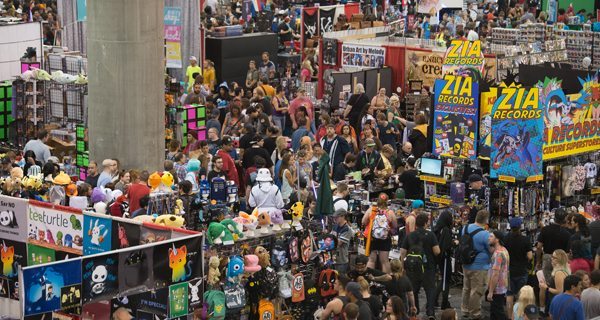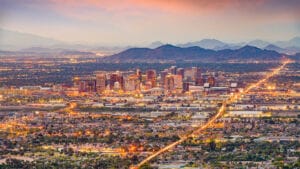 It took George Lucas years and four drafts before he had a finalized script for “Star Wars: A New Hope.” Writer Jerry Siegel’s early comic submissions of Superman resulted in rejections before eventually being accepted by DC Comics. Producers and audiences initially met iconic sci-fi greats like “Star Trek” and “Dr. Who” with skepticism. What does this have to do with the economic impact of Phoenix Comicon? Hold on to your lightsabers and photon torpedoes, you’re about to find out.
It took George Lucas years and four drafts before he had a finalized script for “Star Wars: A New Hope.” Writer Jerry Siegel’s early comic submissions of Superman resulted in rejections before eventually being accepted by DC Comics. Producers and audiences initially met iconic sci-fi greats like “Star Trek” and “Dr. Who” with skepticism. What does this have to do with the economic impact of Phoenix Comicon? Hold on to your lightsabers and photon torpedoes, you’re about to find out.
The birth of Phoenix Comicon was in a Best Western in Ahwatukee, 2002. Like Lucas, Siegel and many other pioneers of science fiction and fantasty, Phoenix Comicon Creator Matt Solberg, founder and CEO of Square Egg Entertainment, began his journey toward success with an idea – or, more specifically, a memory.
“He was inspired by the comics he read in his childhood and from the memory of being a comic vendor in his teenage years,” says Phoenix Comicon Marketing Manger Kristin Rowan of Solberg’s inspiration for creating Phoenix Comicon.
Could Solberg, like so many other creatives and dreamers, envision the magnitude of economic impact Comicon would have in Phoenix? Unless he had “The Force,” perhaps not.
It’s been five years since Comicon’s move from its humble beginnings in the suburbs to Phoenix. Comicon moved to the Glendale Civic Center (2003-2005) to accommodate upwards of 700 attendees. In 2006, the event found a new home at the Mesa Convention Center and hosted 2,600 guests.
“By 2010 Phoenix Comicon attendance doubled to more than 14,000,” Rowan says, “and had expanded to a three-day show with a Thursday preview night.
Fast forward to 2016 and Phoenix Comicon boasted a record total attendance of 216,219 — 106,096 went to Comicon all four days — with an event consisting of more than 1,000 hours of programming, activities and events. Cosplayers from more than 10 different groups roamed the exhibit hall, which expanded to more than 600 exhibitors.
So significant is the local financial revenue of Phoenix Comicon that an economic impact study is currently underway. Although concrete numbers for 2016 are in progress, a previous study reflected that in 2014-2015, Phoenix Comicon produced an economic impact of $10 million a year, which will spike significantly after the dramatic rise in attendance for 2016.
“The more popular the event becomes, the more high-profile visitors and influencers are interested in attending,” Rowan says. “The economic impact for Arizona, Phoenix and specifically the small businesses in the downtown area is considerable, and continues to grow every year.”
Previous celebrity guests have included Alex Kingston, Gates McFadden, Christopher Lloyd, Adam West, Stan Lee and a number of high-profile authors, illustrators and comic book creators. This year, visitors can catch a glimpse of Anthony Michael Hall, Joan Cusack, Curtis Armstrong (“Booger” from “Revenge of the Nerds”), Alan Tudyk, Bonnie Wright and more.
The star power, however, is only one component of what attracts attendees to Phoenix Comicon. “Zombie meet-ups,” “Using Cartoons to Teach Relationship Skills,” “Knit and Crochet for Cosplay” and “Table Top World Building” are like a miniscule solar system of events compared with the near infinite universe of sessions and panels available to attendees.
Don’t be too quick to scream out “nerd alert.” Nerds, cosplayers, geeks and gamers pack the restaurants, hotels and local businesses of Phoenix with their lively spirits, costuming and deep pockets.
“Phoenix Comicon reserves room blocks in seven area hotels and many attendees stay in additional locations in the area,” Rowan says. “With 10 to 12 mealtimes during Phoenix Comicon, many attendees venture outside the convention center.”
Rowan also explains that many downtown businesses partner with Phoenix Comicon to promote exclusive special rates for Comicon attendees, encouraging residents to explore the dining and recreation options in the vicinity.
As for the future of Phoenix Comicon? It might not be on par with Sheldon’s (“Big Bang Theory”) hypothesis of a futuristic “think-a-torium with telepathically controlled flying dolphins,” but as far as economic influence is concerned, it’s safe to say that Phoenix Comicon will “Live long and (the downtown economy will) prosper.”




